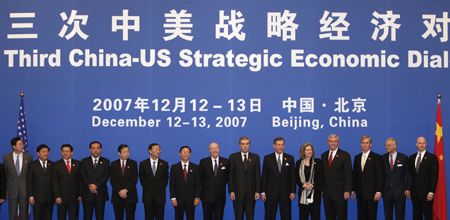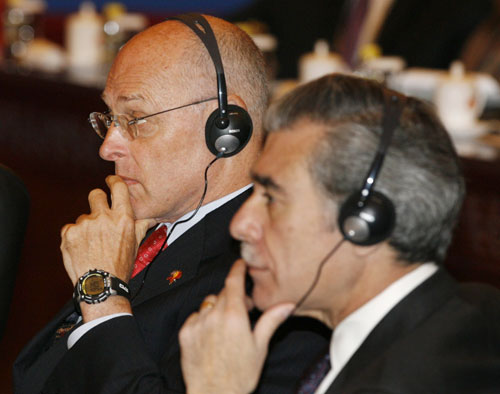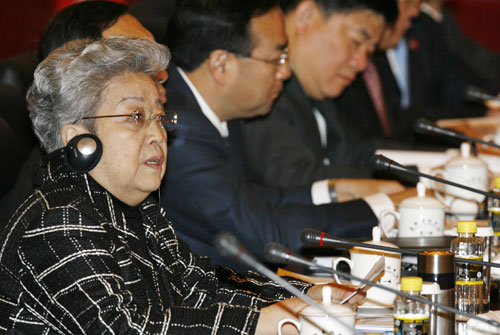Wu and Paulson delivered speeches respectively at the opening ceremony.

Chinese and United States officials pose for group picture during the opening of The Third Strategic Economic Dialogue in Xianghe, near Beijing, December 12, 2007. [Agencies]
Speaking at the opening ceremony of the bilateral Strategic Economic Dialogue, Chinese Vice Premier Wu Yi advocated dialogue and consultation as the only way to settle economic and trade disputes. She recognized that the strong growth of China-U.S. business ties has boosted their cooperation in other fields and has become a foundation for the overall China-U.S. relations.
"History has repeatedly shown it is dialogue and consultation, not confrontation and finger pointing, that has enabled the China-U.S. business relations to grow."

Chinese Vice-Premier Wu Yi gives an opening statement during the opening of The Third Strategic Economic Dialogue in Xianghe, near Beijing, December 12, 2007. [Agencies]

US Treasury Secretary Henry Paulson and Secretary of Commerce Carlos Gutierrez (R) listen to Chinese Vice-Premier Wu Yi (not shown) during the opening of The Third Strategic Economic Dialogue in Xianghe, near Beijing December 12, 2007. [Agencies]
Bilateral trade volume is expected to top 300 billion U.S. dollars this year, said Wu, adding that the two countries are each other's second largest trading partners and that China has been the fastest growing export market for the U.S. for five years in a row.
"We should address issues in our business relations in a constructive way," said Wu, who believes that the talks will help boost China-U.S. business ties and constructive and cooperative relations.
The two-day high-level talks will focus on down-to-earth issues from trade integrity, product safety, balanced economic development to energy and environmental cooperation.
"These issues are those of concern to both countries and demonstrate our shared desire to resolve difficulties and problems in the rapid growth of bilateral business ties," she said.
But Wu warned that "We oppose attempts to politicize trade issues", which will harm the interests of both sides.
"Thanks to accelerated economic globalization, the growing China-U.S. business relations featuring interdependence, mutual benefit and win-win progress have brought our two peoples increasingly closer to each other," the Chinese vice premier said.
"We all hope that both our economies will enjoy sustained growth so as to create more opportunities to expand cooperation in the interest of our respective development," she added.
"This is why we must not allow some interest groups to harm our win-win business relations in pursuit of their selfish interests," she added.
"I am particularly concerned about the 50 protectionist China-related bills introduced in the U.S. Congress," she said. "I must candidly tell Secretary Paulson that these bills, if adopted, will severely undermine U.S. business ties with China."
U.S. Treasury Secretary Henry Paulson, Secretary of Commerce Carlos Gutierrez and Trade Representative Ambassador Susan Schwab sent a joint letter to the U.S. Congress on July 30, rightly pointing out these moves can only be "counter-productive."
About 160 U.S. multinational corporations and industry associations, including Microsoft, Wal-Mart, Citibank and Coco-cola, also sent a joint letter to the Congress on Sept. 26, emphasizing the U.S. trade sanctions against China would only cause negative impact rather than a positive one.
Wu said, "I hope that the U.S. administration, the Congress and the media will heed the voice of the business community."
"I hope they will not lose sight of the larger interests of the United States, follow the historical trend of economic globalization, appreciate the importance of its overall relations with China and the mutually beneficial nature of our business ties, and pursue the right trade policy so as to enable our two peoples to gain more from the continuous growth of China-U.S. business relations," she added.
The vice premier also reiterated that China, whose policy is to maintain a basic balance in international payments, has no intention to seek large trade surplus with the U.S.
"I once again call on the U.S. to relax its export control over hi-tech products for civilian use in China," she said. This is in the interest of the U.S. because it will help expand its market share in China, she added.
"Our policy is clear. China's door is wide open to American products and the key is what policy the U.S. should pursue."
Chinese exports in October jumped 22.3 percent to 107.7 billion U.S. dollars over the same month last year, pushing its monthly surplus to a record 27 billion U.S. dollars.
The allegedly undervalued Chinese currency, the yuan, gives China's exporters an unfair advantage and is a main reason for the massive trade imbalance between China and the U.S., according to U.S. critics.
In addition, Wu Yi said China and the United States should properly address new issues emerging in the course of the growth of bilateral business ties, turn difficulties and challenges into opportunities for cooperation and develop China-U.S. business ties in both depth and width.
China-U.S. business relationship is the most complex one in today's world owing to its huge scale, broad scope and the extensive interests of various parties involved.
"This requires us to view this relationship from a strategic height, demonstrate greater vision and courage, and adopt more effective policy measures to handle in a creative way issues that have occurred as our business ties expand," said the Chinese vice premier.
"We should endeavor to turn difficulties and challenges into opportunities for cooperation, and add new momentum to the growth of our business relations," she added.
Wu took the issue of product quality and food safety as an example, saying that "as economic globalization gathers momentum, product quality and food safety have become a global issue."
This means that the countries concerned must increase cooperation, assume their due responsibilities and strengthen related mechanisms to ensure the quality and safety of people's life, she said.
Before this round of the Dialogue, China and the United States have signed the Memorandum of Agreement on Food and Feed Safety and the Agreement on the Safety of Drugs and Medical Devices.
With regard to China-U.S. trade imbalance, Wu reiterated that China has no intention to seek large trade surplus with the United States, saying that "our policy is to maintain a basic balance in international payments."
Wu said "to address China-U.S. trade imbalance requires the concerted efforts of both sides," and called on the United States to relax export control over export of high-tech products for civilian use to China.
(Xinhua News Agency December 13, 2007)